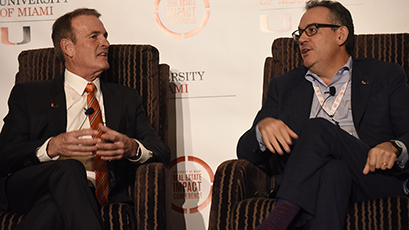As in past years, the conference featured global leaders in commercial and residential real estate in one-on-one conversations. Innovators and trendsetters, informing and shaping the industry’s future were also on hand to share their perspectives and insights regarding disruptive technologies and business models that will continue marking the industry.
The event, which drew many of the who’s who in real estate, kicked off with the panel “Finding Opportunity in Disruption.” Natalia Martinez-Kalinina, general manager of the Cambridge Innovation Center, a real estate services company that bills itself as a “community of entrepreneurs,” moderated a discussion exploring how the commercial real estate industry can partner with, and profit from, firms like Amazon, Bonobos, AirBnB and WeWork as they continue to revolutionize their segments.
“There has always been disruption in the industry. Department stores used to be in the downtowns in the 1800s. They moved to the suburbs in the ‘60s and ‘70s. There have always been bankruptcies,” said James Bry, executive vice president of development and construction at Seritage Growth Properties, a self-managed REIT with a portfolio of 235 properties and 31 joint ventures. “If you go to goods centers, you see a lot of people with bags. Retail is about the entertainment as well as the shopping experience. We’re all still social. The majority of us want to get out of our house and do things. That’s not going to change no matter what generation it is.”Bob Gray, a partner at Rockwood Capital LLC, a real estate investment company managing more than $6.5 billion of equity commitments from investors, agreed that the experience is vital in retail. For that reason, he sees many centers working to bring the supermarket, healthcare providers and fitness businesses into the mall. That makes location more important than ever in a retail world that’s seeing increasing e-commerce disruption.
“Real estate is occupied by tenants, and tenants need employees. We are focused on areas that are conducive to growth. San Francisco is a wonderful exporter of talent to other parts of the world because it’s too expensive for people to rent apartments or buy homes,” Gray said. “We’re focused on Boulder, for example, because Google is going from 400 to 1,500 employees right next door. Value of talent is what’s driving location today. In certain locations rent is not a factor, not when the value of the talent can change industry.”
Next, the audience listened intently to a keynote session with Gregg Pasquarelli, principal and co-founder of SHoP Architects, and David Martin, president and co-founder of Terra. SHoP Architects was named Fast Company’s “Most Innovative Architecture Firm in the World,” while Martin has engaged some of the world's leading architects in distinctive South Florida projects. The duo discussed many of the firm’s innovative projects and how SHoP’s disruptive thinking has impacted the industry.
“Real estate tends to do things the same way until one person innovates and then you all instantly change,” Pasquarelli told Martin. “We’ve found every time, that when we’ve been able to use technology to improve cost control or transparency or lower manufacturing costs in one of our buildings, and we have hard data showing it works, everyone jumps on board.”
In a panel called “Redevelopment Ready: Miami 2.0,” Al Dotson, a Partner at Bilzin Sumberg, moderated a panel about the next generation of South Florida development. Arnaud Karsenti of 13th Floor Investments presented an intensive, mixed-use transit-oriented development in Coconut Grove called The Link at Douglas, followed by Related Urban Development Group Principal and Vice President Al Milo’s discussion of a mixed-income redevelopment plan for Liberty Square, Miami's largest Depression-era public housing project. Michael Comras, president of Comras Company, shared how his firm has partnered with Federal Realty Investment Trust and Grass River on remaking iconic retail projects like Sunset Place and CocoWalk, while working to redesign high street retail on Las Olas Boulevard in Fort Lauderdale.
Rounding out the day was a keynote session with David Simon, Chairman and CEO of Simon Property Group and Stuart Miller, CEO of The Lennar Corporation. The two discussed growing up as a second-generation real estate leader under powerful father figures as well as the evolution of the retail industry from bricks to clicks and from Wall Street to Main Street.
“We bought Sawgrass Mills in ’07 and had $55 million in NOI. Today we have $150 million in NOI,” Simon said. “People want to say retail is going out of business. There are a lot of negative headlines out there but the fact is if you can diversify the mix—if you can bring in the right retailers—if you can make it a real part of the community you can bring in tourism, and grow your business.” Simon emphasized the need for retail centers to invest in better architecture, diversify their mix of uses, and create a holistic experience and sense of place that cannot be replicated by online retailers.
The lead sponsors for the 2017 Miami Real Estate Impact Conference were Douglas Elliman Real Estate, the Kislak Organization, The Witkoff Group and Fortune International Group, who were joined by dozens of other corporate sponsors. Joining the real estate executives in attendance were members the University’s Real Estate Advisory Boards as well as students in the Accelerated MBA in Real Estate program and undergraduate real estate majors from the School of Business along with the Masters of Real Estate Development + Urbanism program in the School of Architecture.

